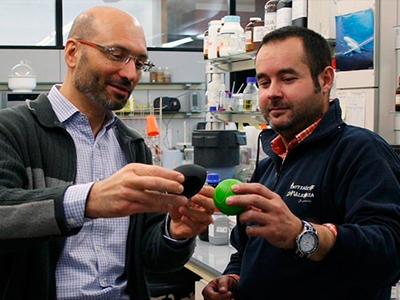
Researchers of the Institute for Molecular Science (ICMol) have shown that high pressure can be a tool to control the magnetic order and improve the properties of some molecule-based magnets. The work, published in Nature Communications, is a step forward towards the future application of these systems.
The research of molecule-based magnets arouses great interest among the scientific community due to its potential applications, such as data storage, quantum computing, molecular spintronics or biomedicine, among others. However, the fact that they only behave as such at very low temperatures is a handicap of many molecular-based magnets. This complicates the technological use at the industrial level due to some difficulties, included the cooling process out of the laboratory. One of the challenges of these researchers in the field of molecular magnetism is to achieve magnetic order at ambient temperature.
Francisco José Martínez Lillo and Joan Cano, researchers in the Coordination Chemistry Group of the ICMol (Parc Científic of the Universitat de València), have demonstrated that it is possible to control the temperature of the magnetic order through high-pressure techniques, and achieve substantial improvements in the possibilities of technological use of such systems.
The study, developed in collaboration with scientists of the United Kingdom –Euan K. Brechin y Konstatin V. Kamenev– shows how the application of an external pressure can modify in a controlled way the temperature of the magnetic order in Rhenium(IV) complexes, the metal ion used in the study. The process is totally controllable and reversible, so that it shows again the original magnetic behaviour when the pressure is removed.
It is the first time that high pressure is used to raise the temperature of the magnetic order at the molecular level. Up to now, no high-pressure techniques had been used in crystallography and magnetism in combination, as in this case. The scientists of the ICMol have studied this effect through high-pressure techniques used on Single-crystal X-ray Diffraction and on SQUID magnetometry (Superconducting Quantum Interference Device). With the aid of theoretical calculations and molecular dynamics in solid, the evolution of the structural changes caused by hydrostatic pressure has been correlated with the resulting magnetic behaviour.
The work, named Pressure induced enhancement of the magnetic ordering temperature in rhenium(IV) monomers, appears published in the last number of the prestigious journal Nature Communications (DOI: 10.1038/ncomms13870) and it is a part of a new line of research opened by these two scientists in the Institute for Molecular Science at the Universitat de València.

